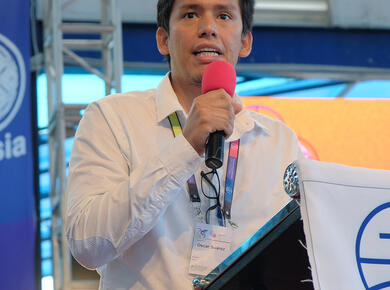Posted: December 30, 2022
Friday morning
Once the laws became progressively more flexible during the lockdown we all experienced in 2020, I was able to cycle through the mountains in my home city. Although we were not allowed to mill about on the street, we were allowed to go out and do sports for a few hours at a time.
During the pandemic that so radically changed our lives, the best thing I could do to remain grounded was go cycling. I enjoyed every outing, not only for the physical activity but also for the opportunity to take in marvellous views hidden within the mountains of the beautiful city where I was born, Ibagué, Colombia.
Each morning, despite sometimes feeling sleepy, I got ready to go for a ride, anticipating discovering more of the beautiful work of our Creator. I was looking for a new, colourful scene to photograph, a new view from the top of the mountains, simple peasant families waving and urging me on along the route, and of course, a new physical challenge. I realized that, more than the physical exercise, it was like therapy, giving me peace of mind.
Each outing confirmed for me what the superlative emphasizes in Genesis 1:31: “God saw everything that he had made, and indeed, it was very good”. God’s creation is perfect! He put everything in its place, including us as human beings. This verse is included in the account of the sixth day on which God created humanity
The scenery that I was able to take in, the vegetation, the animals and also the humans are all part of God’s creation. All of it together is included within the adjective used only at the end of the sixth day “God saw that it was good”
After seeing these great wonders, I asked myself: Why do we want to destroy God’s perfect work? Why do we, as humans, expend so much effort in destroying it? Is this a reflection of our sinful nature?
I am convinced that a large part of the damage is due to the ambitions of powerful people. And yes, ambition and envy are what prompt them to ride roughshod over others and creation itself without considering the damage being caused for the benefit of only a few.
I have already told you that my city is surrounded by majestic mountains that harbour beautiful views and a wealth of natural diversity for all to see. Well, almost, but not quite all. In addition to peasants, indigenous communities and cyclists, a multinational company has discovered the wealth hidden beneath the soil.
They requested a licence to explore and then exploit open pit gold mines. This spectacular place – brimming with diversity – is a source of life not only because of the water that springs up there, but also because it produces a great quantity of food for the region. This is being put at risk, all for the sake of gold.
Naturally, the peasant, indigenous and civil society communities joined together to put a stop to this unprecedented ecocide in the region. My church community did not stand by idly on this problem. The Ibagué Mennonite Church joined the movement that slowly but surely turned into a symbol of resistance and love of creation. As part of our commitment to steward creation, we joined with other movements and expressions of faith that diverge from our own. We joined because of our love of the natural beauty and life itself.
In his book, Anabaptist Essentials, Palmer Becker reminds us of three core values that he says define us as Anabaptists. We are probably all familiar with them.
Can you recall them?
- Jesus is the centre of our faith.
- Community is the centre of our life.
- Reconciliation is the centre of our work.
I can see these three values reflected in the Ibagué Mennonite Church’s experience I just told you about.
Jesus is the centre of our faith, guiding us in love for one another and for Creation.
Community is the centre of our lives, reflected in who we care about and as we help one another to defend our territory.
And, reconciliation is the centre of our work, bringing together people around a shared problem in spite of their divergent thoughts and beliefs.
Beyond this, though, is the task of not only being reconciled to God and our neighbour, but also with nature – our sister and the work of our Father; Pacha Mama (Mother Earth); the source of life.
Thanks to God, and the unity of the people, a public consultation managed to stop the exploration and the exploitation of gold in our mountains. The project tried to sell the idea of development for the region, but the people came out on the side of water and life in place of gold.
I am aware that this does not make up for the suffering of our planet at this moment, but it is an example of the change that can be achieved when we work together as a community, caring for creation. Of course, small actions are also valuable and count, and even more so if each one of us practices caring for the environment.
So, I would like to conclude with a question.
- If all of us have heard of reduce, reuse, recycle, what are we doing to leave a small mark for the better in our environment?
- What changes are we bringing about in our communities?
- Are we impacting our contexts with the Anabaptist value of reconciliation with God, our neighbours and nature with the utmost of love?
—Oscar Suárez is the YABs (Young AnaBaptists) Committee representative for Latin America and the Caribbean (2017-2022). He serves as a teacher in Colegio Americano Menno (a Mennonite school in Colombia) and youth leader for Iglesia Menonita de Teusaquillo in Bogotá. He is a member of Iglesia Menonita de Ibague, Colombia.



Join the Conversation on Social Media
FacebookTwitterInstagramFlickrYouTube